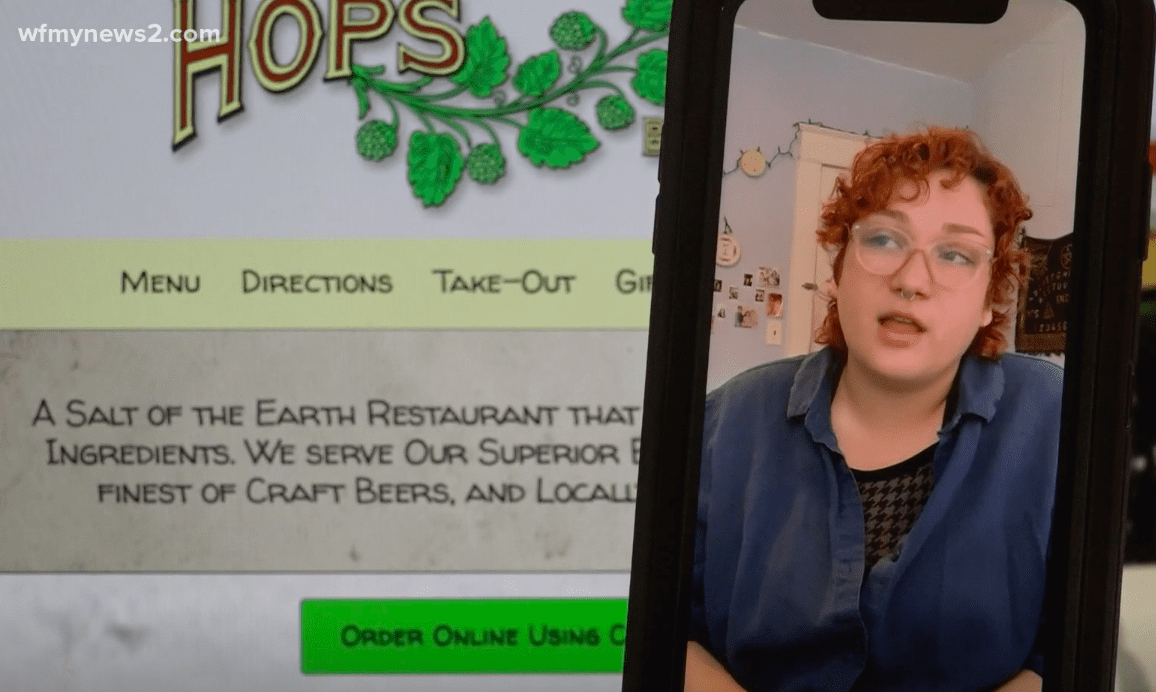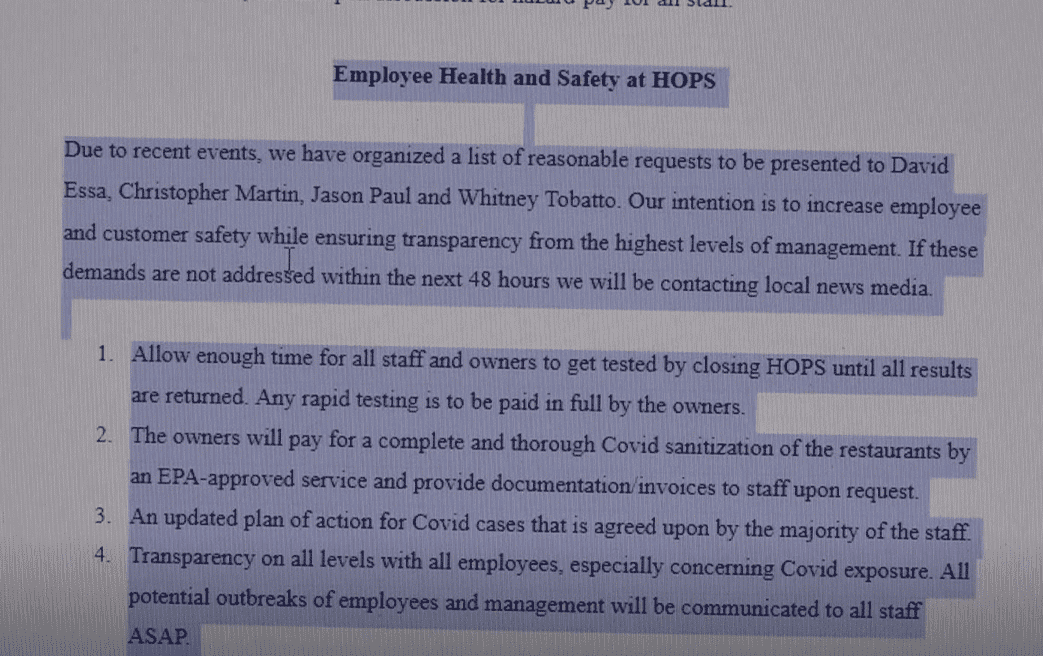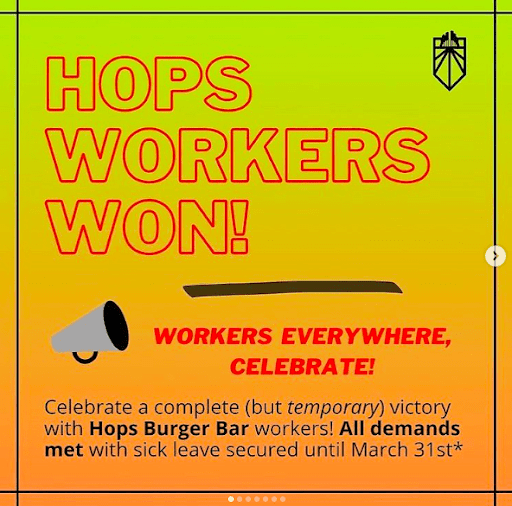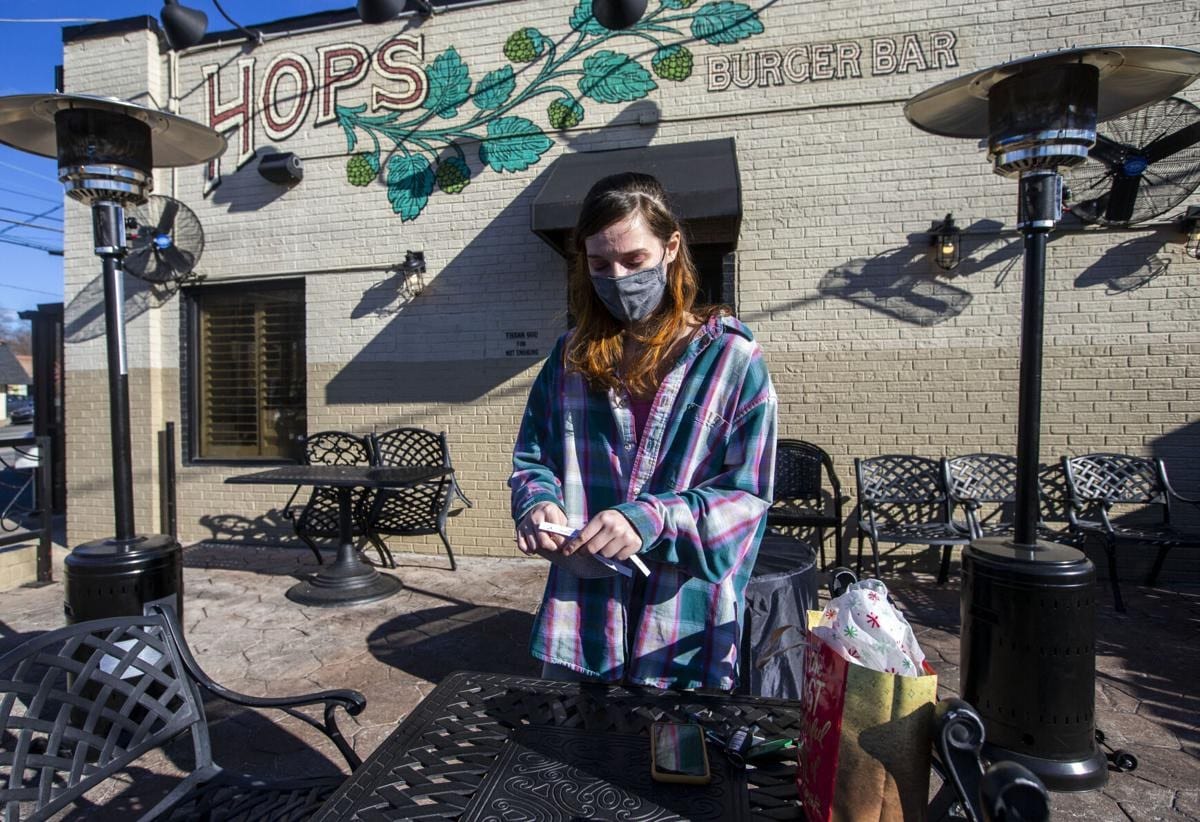How these restaurant workers won their campaign for COVID-19 protocols
FEBRUARY 18, 2021 | COWORKER.ORG

Restaurant workers at Hops Burger Bar in Greensboro, North Carolina spoke out about their concerns with the company’s coronavirus-related protocols -- and it paid off.
Out of concern for themselves as well as customers and the broader community, workers created a list of ten changes to improve health and safety standards at the burger and beer restaurant. In late December 2020, they also launched a public petition on Coworker.org for their coworkers and supporters to show support for their demands. Their campaign caught the attention of local media outlets and shortly after a one-day strike, management agreed to many of their demands.
We asked Lillian Thorne, one of the workers, to tell us more about how these workers won better conditions in their workplace.
What were some of the experiences in your workplace that sparked this organizing and how did the effort get started?
COVID-19 has been hard for everyone. We shut down at the beginning of the pandemic, so people were happy when we opened back up, especially since some people struggled to get unemployment. We closed down for about two weeks during the summer. We assumed that ownership did this to take precaution and ensure worker and community safety since there were positive COVID-19 cases at one of our Lawndale locations. We found out in December that the only reason why our owners had us close down was because Lawndale workers demanded that they do so for everyone’s protection. We found this out from an anonymous Reddit post by a former Hops employee. This person also said that workers at Hops on Lawndale weren’t made aware that their location had positive cases. We also had a case at our location (on Spring Garden) that workers learned about through a Facebook post instead of our bosses. When we asked why we weren’t notified right away, they gave us excuses. We followed in the footsteps of our fellow Hops workers during the summer and organized a list of demands. It happened so fast — it only took us about an hour or so of messaging in our “no managers” group chat for us to agree on our demands. We decided to all call out of work the following day and presented our list of demands to them that same day.
What was management’s initial response to your list of demands?
We were reassured that everything would be handled and that we were being heard. We had originally planned to give them 48 hours to meet our demands or at least negotiate with us. Some of my coworkers wanted to trust in good faith that management would help us get all that we asked for. Our “no managers” group chat was ratted out, and after only being closed for two days, we moved to curbside and had a new schedule. All of those things combined made my coworkers hesitant to keep fighting.
How did you decide to do a one-day strike and what was the impact of that action?
We chose to strike because we wanted our owners and management to know that we were serious about our demands, and that we didn’t deserve our health being risked so that our restaurant could stay open and make money. We originally wanted to strike until the demands were met but management took their time, people were scared and they needed money so it ended up only being one day.
What role do you think the public petition played in winning better policies at Hops?
When we first started organizing we talked about petitions, social media posts, and press releases to put community pressure on ownership to do what’s right for the workers and the community. I think the petition showed ownership that our community supports us, and doing so put pressure on them to meet our demands.


Are there any outstanding demands that have not been addressed by management?
It took longer than we wanted but we had all of our demands met, with one exception: that we close down for two weeks for workers to have enough time to social distance from work and get accurate test results back. Ownership obviously didn’t want to lose profits during that time, and had we not lost momentum as a group, we would’ve been able to fight for it.
Now that you’ve experienced the power of collective action in your workplace, what’s next for you and your coworkers?
We’re hoping that all workers know what paid sick leave their employers are offering them and how to ask for it. We hope that when paid sick leave through the FFCRA [The Families First Coronavirus Response Act] expires in March, that our government extends it through the rest of COVID-19 and that our employers take advantage of it for the worker’s sake.

Any most important tips you would share with other workers interested in starting out a similar effort in their own workplaces?
It can be scary to stand up to bosses but all workers are capable of this work. You know better than the bosses what you need for a safe and just workplace and you can fight for it! Talk with your coworkers and get to know who they are and what they experience in and out of work. Build trust between y’all, and be confident in your abilities! Also, don’t be afraid to talk to people in your community: you won’t know until you ask who you can go to for resources and support.
How can people follow your work in Greensboro?
Follow @SunriseLabor on Instagram and consider donating to $GreensboroStrikeFund on cashapp!
Coworker.org is a global platform to advance change in the workplace. Our platform makes it easy for individuals or groups of employees to launch, join, and win campaigns to improve their jobs and workplaces. You can start your own campaign for changes you want to see in your workplace here at Coworker.org, or contact us at [email protected] if you would like to discuss a workplace issue with our team.
Ready to create a campaign to change your workplace?
Every day, people are launching and joining campaigns around issues large and small - from improving an office breakroom to providing paid sick leave to employees.

